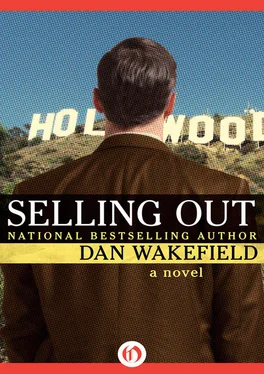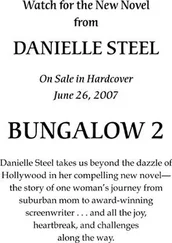“Hell no,” said Perry, shrugging loosely, relaxed, warm not only with the sun, but success.
He could feel a pleasant sensation, a sort of glow in the area between his stomach and his groin.
He was hot.
When Perry got back from lunch and called his service, instead of the familiar “All clear,” he had seven messages. It was as if the word of his being hot, a desirable person to call, had gone out through the atmosphere. There was a message to call his public relations person, who no doubt wanted to get his new deal in the trades as well as the atmosphere. Perry smiled, feeling glad he hadn’t fired the guy out of fear of being broke. It was smalltime to try to cut corners and save a few bucks. “Don’t think poor” was one of the vital rules of survival in this high-stakes game he was playing now—not just playing, but winning.
When he called Ravenna, her secretary got her right away. No delays, nothing about being in a meeting, when she was simply filing her nails, oh no. Not for a hot client. He hoped she had closed the deal so he could get right to work; he was anxious, eager, to get that sparkling dialogue onto the page, to establish the sha-boomlike pace of the story of the psychic dog. He had already begun to wonder if perhaps Ravenna, with her wily negotiating power, had even got him a little more than a hundred grand for the job; maybe a little sweetening of the pot, up to—say—one-twenty-five?
“ Darling ,” she cooed, “I think we have our deal.”
“Great,” Perry said, “how much?”
“Well, Ralph Stilleta—he’s business affairs for Ursa Major—is a real hardass. He started at thirty, told me he was absolutely holding the line at thirty-five, but I got him to thirty-seven-fifty! With a guarantee on the back end of another five if it goes to film!
Perry was speechless for a moment. Had Ravenna confused him with some other client?
“I don’t understand,” he said.
“What’s that?”
“I don’t understand. What’s this shit about thirty-something? You said I ought to get a hundred.”
“Perry, I beg your pardon. I said no such thing. That’s out of the question.”
“You, Ravenna Sharlow, did not tell me I ought to get a hundred grand for doing a feature? And isn’t one of the whole points of my doing this to get a credit for a feature?
“Darling, this is a re write.”
“But it’s a rewrite of a feature —and besides, it’s not really a rewrite. Kling told me he wanted me to read the first script and then throw it away. Do what I want.”
“Darling?”
It was Ravenna’s patient, instructive tone.
“Yes.”
“A rewrite is a rewrite is a rewrite.”
“You sound just like Larman Kling.”
There was some other successful person who said things in threes also, wasn’t there? Oh—sure. Gertrude Stein. Perry had almost forgotten about her.
“I guess I have no choice,” Perry said.
“This is going to turn things around for you, sweets.”
“All right. I’ll do it.”
Ravenna blew him a kiss through the phone.
Earlier, when Perry thought he was going to make at least a hundred grand on this, he had called Liz Caddigan and asked her to dinner. Now he called back and canceled. He figured under the circumstances he would only be thirty-seven-and-a-half-percent effective. Liz would probably be able to ascertain the exact figures of his new deal.
He called Ronnie Banks. Maybe a little hit of coke would bring him up again.
He didn’t tell anyone but his agent he was moving to the Valley.
Before he came to Los Angeles that name always conjured up in his mind bucolic scenes from the lovely old movie How Green Was My Valley , and the lilting folk song “Down in the Valley”—gentle meadows and babbling brooks, heather and fern and sparkling pond. But here it meant the San Fernando Valley, a flat, featureless, anonymous expanse of sun-baked tracts, a grid of endless, seemingly identical streets of Dairy Queens and dry cleaners, used-car lots and Laundromats, storefronts with secondhand furniture sitting out front on the sidewalk, cement-block bars with slits for windows.
Of course there were nice places in the Valley, expensive places.
“The Valley is really coming up these days,” Ravenna said encouragingly. “Have you seen the new boutiques on Ventura Boulevard?”
Perry couldn’t help thinking of the Vardemans’ snide references to the Valley, locating it on their own social map.
Pru said the Valley was where one went to get inexpensive maids and baby-sitters. It was silly to seek such help in Beverly Hills when the rates were so much better in the Valley.
Vaughan had dismissed a novel once that was being promoted as “an inside peek at Hollywood” by protesting, “that’s not about Hollywood, for God sake, it’s about failed television writers who live in the Valley.”
Perry wasn’t really living there, of course, he was simply staying with Ronnie Banks while he put his condo on the market. He was renting it out at a loss—there was no way he could get the three grand a month that the mortgage cost—but he couldn’t concentrate on writing while realtors and prospective buyers roamed in and out. Ronnie invited him to come out and split the modest rent of $400 a month, using the fold-out bed in the living room, and it worked out fine.
It was good for Perry, not being alone right now. He and Ronnie had become real pals. They went out for pizza or Chinese food at night, drank, smoked some grass, occasionally did a line or so of coke, talked about the theater, women, art, you name it.
The only problem was the goddam script.
“So how is it going, are you into the flow, can you feel the flow, do you know?”
“Larman, great to talk to you!” Perry said, pressing his hand on his temples as if that might help force out a positive, upbeat response. He glanced at his typewriter and the card table set up beside it with his paper and what there was of the script so far. Then he turned away, as if not actually looking at the script while he spoke would make it easier to tell the necessary lies.
The fact was he only had three pages.
He had worked every day for two weeks and he only had three pages. Oh, he had written many more but he had torn them all up. After a fabulous start, it seemed as if the whole thing had shut down on him, like an iron gate.
“It’s going great!” he shouted into the phone. “Yeah, the flow is flowing, I mean it’s growing, growing every day, I just can’t stop it flowing!”
“I can’t wait to see, when can I see, can you bring some pages up to me?”
“Oh, well yes, hell yes, just give me about a week, another week, to put what I got together and get some more!”
What the hell else could he say?
Larman Kling’s secretary came on the line and made an appointment for Perry to come up the following Wednesday at ten in the morning. Larman wanted to read the pages while Perry was right there with him.
Holy God.
He had to do something. He had to get words on paper by a week from tomorrow. Whatever he had to do to make that happen, he would do it.
FADE IN
EXT—JOHNSON HOUSE—DAY
A small yellow frame house on an ordinary block in an ordinary American midwestern town. There is an elm tree in the front yard. A toy red wagon is sitting beside it. DANNY, a boy about ten years old, freckle-faced and natural in muddy jeans and a St. Louis Cardinals T-shirt and Little League baseball cap worn backwards, comes out of the house, looks around, puts two fingers in his mouth and whistles. There is no response, and DANNY now cups his hands to his mouth, closes his eyes, and tilts his head back, calling as loud as he can.
Читать дальше












